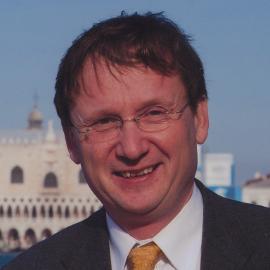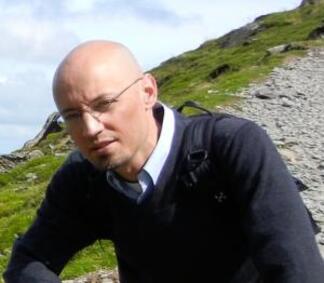
University of Cambridge, PhD '92
BIOGRAPHY
Adrian Johns is the author of The Science of Reading: Information, Media, and Mind in Modern America (Chicago, 2023), Death of a Pirate: British Radio and the Making of the Information Age (Norton, 2010), Piracy: The Intellectual Property Wars from Gutenberg to Gates (Chicago, 2009), and The Nature of the Book: Print and Knowledge in the Making (Chicago, 1998), and co-editor (with James Evans) of Beyond Craft and Code: Human and Algorithmic Cultures, Past and Present (Osiris 38, 2023, forthcoming). He has also authored dozens of papers in the histories of science, the book, media, and information. The Nature of the Book won the Leo Gershoy Award of the American Historical Association, the John Ben Snow Prize of the North American Conference on British Studies, the Louis Gottschalk Prize of the American Society for Eighteenth-Century Studies, and the SHARP Prize for the best work on the history of authorship, reading, and publishing. Piracy won the Laing Prize and was selected as Book of the Year by the American Society for Information Science and Technology. Johns has been awarded Guggenheim, ACLS, NEH, and NSF fellowships. Educated in Britain at the University of Cambridge, he has also taught at the University of Kent at Canterbury, the University of California, San Diego, and the California Institute of Technology.
Recent Research / Recent Publications
The Science of Reading: Information, Media, and Mind in Modern America (Chicago: University of Chicago Press, 2023).
Beyond Craft and Code: Human and Algorithmic Cultures, Past and Present (Osiris 38, 2023). (Co-edited with James Evans.)
Presentation on "The Science of Reading and the Making of the Information Society," UIUC, March 2024 (video).
Presentation on “After Hours: Historia Coelestis,” Linda Hall Library, November 2022 (video).
Publication of “Piracy in the Book Trade” [essay review of Robert Darnton, Piracy and Publishing], American Historical Review 127:3 (September 2022), 1433–1435.
“Watching Readers Reading.” Textual Practice 35:9 (October 2021), 1429-52.
“Privacy.” In A. Blair, P. Duguid, A.-S. Goering, and A. Grafton (eds.), Information: A Historical Companion(Princeton: Princeton University Press, 2021), 686-93.
“The New Rules of Knowledge” (with James Evans). An introduction to a tryptich of papers on algorithmic epistemology. Critical Inquiry 46:4 (Summer 2020), 806-12.
“Lay Assaying and the Scientific Citizen.” Proceedings of the American Philosophical Society 160, no. 1 (Mar. 2016): 18–25.
”The Coming of Print to Europe.” In The Cambridge Companion to the History of the Book, edited by L. Howsam, 107–24. Cambridge: Cambridge University Press, 2015.
“Intellectual Property.” In Globalization in Practice, edited by N. Thrift, A. Tickell, S. Woolgar, and W. H. Rupp, 183–88. Oxford: Oxford University Press, 2014.
“The Uses of Print in the History of Science.” Papers of the Bibliographical Society of America 107, no. 4 (Dec. 2013): 393–420.
“The Ecological Origins of Copyright Skepticism.” World Intellectual Property Organization Journal 5, no. 1 (2013): 54–64.
“The Information Defense Industry and the Culture of Networks.” Amodern 2: Network Archaeology (2013).
Death of a Pirate: British Radio and the Making of the Information Age. New York: W.W. Norton, 2010.
Piracy: The Intellectual Property Wars from Gutenberg to Gates. Chicago: University of Chicago Press, 2009.
- Gordon J. Laing Award, University of Chicago Press
- Book of the Year Award, American Society for Information Science and Technology
- Outstanding Academic Title Awards, Choice Magazine
The Nature of the Book: Print and Knowledge in the Making. Chicago: University of Chicago Press, 1998.

University of Chicago, PhD '05
BIOGRAPHY
My first book, Enlightenment's Frontier: the Scottish Highlands and the Origins of Environmentalism (Yale, 2013) investigates the environmental roots of the Scottish Enlightenment. What was the place of the natural world in Adam Smith's famous defense of free trade? This perspective recovers the forgotten networks of improvers and natural historians that sought to transform the soil, plants, and climate of Scotland in the eighteenth century. The Highlands offered a vast outdoor laboratory for rival liberal and conservative views of nature and society. But when the improvement schemes foundered toward the end of the century, northern Scotland instead became a crucible for anxieties about overpopulation, resource exhaustion, and the physical limits to economic growth. In this way, the rise and fall of the Enlightenment in the Highlands sheds new light on the origins of environmentalism.
My second book, Green Victorians: The Simple Life in John Ruskin's Lake District (Chicago, 2016), coauthored with Vicky Albritton, considers the problem of the Anthropocene from the perspective of a late Victorian utopian movement. Green Victorians tells the story of the first "post-carbon" society in Britain, a community in the English Lake District dedicated to Arts and Crafts industry and simple living. This experiment was galvanized by precocious anxieties about anthropogenic climate change, voiced by the eccentric polymath John Ruskin. He convinced his supporters to reject coal and steam in favor of renewable energy and labor-intensive handicraft production. By creating a new culture of sufficiency, Ruskin and his followers sought to demonstrate that a simple material life was still compatible with a great measure of cultural creativity and intellectual freedom. Green Victorians explores the radical and material experience of Ruskin's community without shying away from the darker side of the movement, including its technophobia and paternalism.
My current research deals with a set of closely related themes in environmental history, history of science, and political economy. The British Industrial Revolution saw the birth of the first fossil fuel economy. At the same time, geologists transformed the public understanding of the earth's interior and deep past. My new project sets out to show that these developments—fossil growth and fossil science—converged to produce a fundamental reorientation of politics and culture towards cheap energy and cornucopian growth.
My research has been funded by fellowships from the Institute of Historical Research in London, the Andrew W. Mellon Foundation, the Huntington Library in Los Angeles, the American Council for Learned Societies, and the Notre Dame Institute for Advanced Study.
Recent Research / Recent Publications
- Fredrik Albritton Jonsson and Carl Wennerlind, Scarcity: Economy and Nature in the Age of Capitalism, Harvard University Press, 2023.
- Coauthor with Vicky Albritton. Green Victorians: The Simple Life in John Ruskin's Lake District. Chicago: University of Chicago Press, 2016. Ruskin Society Book Prize 2016 (runner up).
- Enlightenment's Frontier: The Scottish Highlands and the Origins of Environmentalism. New Haven, CT: Yale University Press, 2013.
- Editor with John Brewer, Neil Fromer, and Frank Trentmann, Scarcity in the Modern World: History, Politics, Society and Sustainability 1800-2075, Bloomsbury Press: 2019
- “Ruskin in the Year of COVID 19,” Ruskin Birthday Reflections, Reilly Center, Notre Dame, February 8, 2021
- Contributor to Roundtable on Duncan Kelly, Politics and the Anthropocene for H-Diplo.
- “Natural History” in Old Ways New Roads, ed. Nigel Leask et al (Edinburgh: Birlinn 2021), museum catalogue for 2020 exhibition about Highland tour at the Hunterian Museum in Glasgow
- "The Coal Question Before Jevons." Historical Journal 62, no. 2 (June 2019).
- "Growth in the Anthropocene." In Scarcity in the Modern World: History, Politics, Society, and Sustainability, 1800–2075, edited by John Brewer, Neil Fromer, Fredrik Albritton Jonsson, and Frank Trentmann. London: Bloomsbury Press, 2019.
- “Roundtable: The Anthropocene in British History [with Chris Otter, Alison Bashford, John Brooke, and Jason Kelly]." Journal of British Studies 57, no. 3 (July 2018): 568–96.
- "Abundance and Scarcity in Geological Time 1784–1844." In Nature, Action, and the Future: Political Thought and the Environment, edited by Katrina Forester and Sophie Smith, 70–93. Cambridge: University of Cambridge Press, 2018.
- "Political Economy." In Historicism and the Human Sciences in Victorian Britain, edited by Mark Bevir, 154–85. Cambridge: Cambridge University Press, 2017.
- "Scottish Tobacco and Rhubarb: The Natural Order of Civil Cameralism in the Scottish Enlightenment." Eighteenth-Century Studies 49, no. 2 (Win. 2016): 129–47
- "Adam Smith and Enlightenment Studies." In Adam Smith: His Life, Thought, and Legacy, edited by Ryan Patrick Hanley, 443–60. Princeton, NJ: Princeton University Press, 2016.
- "Island, Nation, Planet: Malthus and the Enlightenment." In New Perspectives on Malthus, edited by Robert J. Mayhew, 128–54. Cambridge: Cambridge University Press, 2016.
- "Climate Change and the Retreat of the Atlantic: The Cameralist Context of Pehr Kalm's Voyage to North America 1748–51" William and Mary Quarterly 72, no. 1 (Jan. 2015).
- "The Origins of Cornucopianism: A Preliminary Genealogy." Critical Historical Studies 1, no. 1 (Spr. 2014).
- "Adam Smith in the Forest." In The Social Lives of the Forests, edited by Susanna B. Hecht, Kathleen D. Morrison, and Christine Padoch. Chicago: University of Chicago Press, 2013.
- "Natural History and Improvement: The Case of Tobacco." In Mercantilism Reimagined: Political Economy in Early Modern Britain and Its Empire, edited by Philip J. Stern and Carl Wennerlind. Oxford: Oxford University Press, 2013.
- "A History of the Species?" Review essay of Deep History: The Architecture of Past and Present, edited by Andrew Shyrock and Daniel Lord Smail, History and Theory 52, no. 3 (Oct. 2013).
- "The Industrial Revolution in the Anthropocene." Journal of Modern History 83, no. 3 (Sept. 2012).
- "Rival Ecologies of Global Commerce: Adam Smith and the Natural Historians." American Historical Review 115, no. 5 (Dec. 2010).
- "Prudence and Magnanimity: Roundtable on Ryan Hanley's Adam Smith and the Character of Virtue." The Art of Theory: Conversations in Political Philosophy (Nov. 2010).
- "Enlightened Hands: Managing Dexterity in British Medicine and Manufactures 1760–1800." In Body Parts: Critical Explorations in Corporeality, edited by Christopher Forth and Ivan Crozier. Lanham, MD: Lexington Books, 2005.
- "The Physiology of Hypochondria in Eighteenth-Century Britain." In Cultures of the Abdomen: Dietetics, Digestion, and Fat in the Modern World, edited by Christopher E. Forth and Ana Cardin-Coyne. Palgrave Macmillan, 2005.
- Co-authors "Reducing the Carbon Footprint of Academic Travel," Inside Higher Ed, Apr. 18, 2019
- Launches planetary history research project with Dipesh Chakrabarty
- Participates in Q&A on how to teach the Anthropocene, EuropeNow, with syllabus
- Discusses Amitav Ghosh’s recent book, The Great Derangement: Climate Change and the Unthinkable, in an article in the Guardian.
- Coauthors, with Vicky Albritton, Green Victorians: the Simple Life in John Ruskin's Lake District (Chicago, 2016). Ruskin Society Book Prize 2016 (runner up).
- Coorganizes "Climate Change: Disciplinary Challenges to the Humanities and Social Sciences" at the Neubauer Collegium
- Delivers the inaugural T. C. Smout Lecture in Scottish History on the "Enlightenment's Frontier: The Scottish Highlands and the Origins of Environmentalism" [audiocast, 55 minutes
- Talks at the Social Life of Forests Conference on "Invisible Forests: Natural Knowledge in the Making of Classical Economics" [video, 27 minutes]
- Co-author with Rachael Osborn, Mark Fiege and Will Wright, Amicus brief of environmental historians, Juliana v. United States, February 22, 2019.

Harvard University, PhD' 90
BIOGRAPHY
I am a historian of Britain and its Empire, of comparative revolutions, comparative empires, and of northern Europe more broadly. I am both a deeply committed archival historian and a scholar who believes profoundly that historians should engage with the social sciences. My first book, Protestantism and Patriotism, was an entangled and comparative study of English and Dutch politics, culture, and society in the mid-seventeenth century. I traced the decline of apocalyptic thinking and the rise of notions of political economy in England and the Dutch Republic. My second major monograph, 1688: The First Modern Revolution, offered both a major revisionist account of England's Glorious Revolution and a reappraisal of the literature on revolutions more broadly. I showed that far from being an unrevolutionary revolution, the Revolution of 1688 radically transformed English state and society. The revolution, I suggest, can only be understood by placing it in a European and global context. Since 1688 was a radical revolution, I suggest, it is imperative to rethink the nature of revolutions since so much of that literature assumed that the later eighteenth-century French Revolution was the first modern revolution. My third monograph, The Heart of the Declaration, argued that by placing the American Revolution and its seminal document, the Declaration of Independence, in an imperial rather than proto-national context it becomes clear that Americans broke away from Britain not because they resented the imperial state but because they wanted a different kind of state—one that would actively promote social and economic prosperity and equality.
I am currently engaged in a number of research projects. For the past decade I have been working on a Global History of the British Empire, ca. 1650–1784. This book, based on research in a wide range of European, North American, and West Indian archives, insists that the British imperial state was just as institutional strong if structurally distinct, from its rivals. Throughout the empire Britons debated and fought over the kind of imperial state they wanted. Some wanted to focus on a political economy that privileged colonial production over one that emphasized colonial consumption; some wanted an empire that favored England, while others thought the empire should be organized as a confederation; some thought chattel slavery was essential to the prosperity of the empire while others decried cattle slavery as economically and morally deleterious; some thought the empire should protect and promote the development of indigenous peoples, while others thought indigenous peoples were a barrier to imperial development. I insist that accounts of the colonies that focus on the binary relationship between a particular colony or set of colonies and Britain will necessarily misunderstand that relationship. The British Empire can only be understood as a global phenomenon. It is essential to think the empire whole. I am working on a second monograph, Partners in Revolution, that compares the Irish Revolution of 1782 and the American Revolution. I highlight the social, cultural, and ideological similarities between the Irish and American situations. The book explains why Americans severed ties with the British Empire and the Irish did not. I suggest that one of the consequences of the abortive Irish Revolution was that the re-emergence of confessional divisions in Ireland. Finally, I am working on a set of essays (maybe a book) with James Robinson of Harris Public Policy, trying to explain British divergence: why was it that Britain, and not China, India, France, or the Dutch Republic, became the first industrial nation? Why did the British state take the distinctive form that it did?
My research has been supported over the years with fellowships from the Harvard Society of Fellows, the ACLS, the Guggenheim Foundation, the Dorothy and Lewis B. Cullman Center, the Institute for Advanced Studies at Princeton, the Woodrow Wilson Foundation, and the American Philosophical Society. I have been a visitor at All Souls College (Oxford), EHESS (Paris), IMT (Lucca) and the University of Warwick.
I am deeply committed to both undergraduate and graduate education. I am happy to supervise senior theses and doctoral dissertations on any topic in British history, the history of the British Empire, Atlantic history, Dutch history, political economy, revolutions, comparative empires, history of European ideas, seventeenth- and eighteenth-century religious history, and the cultural history of seventeenth- and eighteenth-century Europe.
I have supervised over twenty doctoral dissertations covering a wide range of topics. Some topics have included the origins of humanitarianism in seventeenth- and eighteenth-century Europe, the rise of the Patriot party in the eighteenth-century British Empire, the emergence of associational life in the British Empire, the East India Company and the emergence of British India, politics of the navy and the British Empire, the transformation of British India in the late eighteenth century, the Anglo-French-Indian struggle for the Ohio Valley, British imperial indigenous policy in Scotland, North America, and Bengal, the high church reaction to the Revolution of 1688, the remaking of the Church of England after the Act of Toleration, the Scottish Kirk in the early eighteenth century, the rise of opera in Britain, the making of the English Caribbean in the late seventeenth century, British monetary policy in the late seventeenth and eighteenth centuries, the rise of slave labor in the British Empire, Leisler's Rebellion and its consequences, British party politics in the early eighteenth century, the persistence of Catholicism in the British Empire, and many more.
I am a co-convenor of the History and Social Sciences and the Empires and the Atlantics forums.
Recent Research / Recent Publications
The Heart of the Declaration: The Founders’ Case for Activist Government. New Haven, CT: Yale University Press,, 2016.
co-edited with Peter Lake. The Politics of the Public Sphere in Early Modern England: Public Persons and Popular Spirits. Manchester: Manchester University Press, 2012
1688:The First Modern Revolution. New Haven, CT: Yale University Press, 2011.
- Morris D. Forkosch Prize, American Historical Association
- Gustav Ranis International Book Prize, Yale MacMillan Center
- Bronze Medal, Independent Publisher Book Awards
England’s Glorious Revolution 1688–1689: A Brief History with Documents. Boston: Bedford/St. Martin's, 2006
co-edited with Alan Houston. A Nation Transformed: England after the Restoration. Cambridge: Cambridge University Press, 2001.
Protestantism and Patriotism: Ideologies and the Making of English Foreign Policy, 1650–1668. Cambridge: Cambridge University Press, 1996.
-
Co-edits volume The Politics of the Public Sphere in Early Modern England (Manchester University Press, 2019)
-
Discusses "How the Radical Aims of the American Revolutionaries Are Relevant Today," Valdai Discussion Club, June 8, 2017 [video, 94 mins]
-
Delivers "The Founders' Case for Strong Government," George Washington Forum, Ohio University, February 23, 2017 [video, 81 mins]